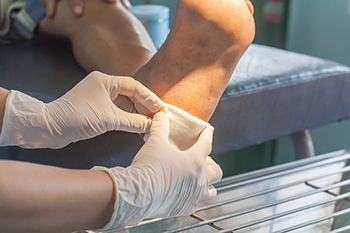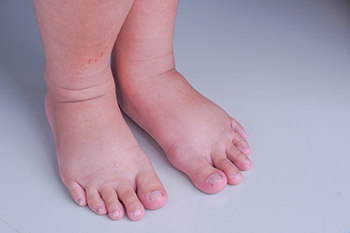August 2023
Negative Pressure Wound Therapy

Diabetes is a condition that affects how sugar in the blood is controlled. Those with the condition are at a greater risk of developing wounds on their feet because of nerve and vein damage. These can be painful and take a long time to heal. If left untreated, they can lead to amputation of the foot or leg. Negative pressure wound therapy, or NPWT, is a method where a special dressing is put on the wound, and a machine sucks out any fluid from the wound. This method is used to help wounds heal faster, but it is more expensive than regular wound dressings. Studies on this method have shown that while this is a beneficial treatment, it may not be better than traditional foot wound treatment, and more research is needed. Diabetes is a serious condition, and if you are suffering from this disease and have foot problems, including wounds on your feet, it is strongly suggested that you make an appointment with a podiatrist for an accurate diagnosis and treatment.
Wound care is an important part in dealing with diabetes. If you have diabetes and a foot wound or would like more information about wound care for diabetics, consult with Naim G. Shaheed, DPM from Ankle and Foot Centers of Georgia. Our doctor will assess your condition and provide you with quality foot and ankle treatment.
What Is Wound Care?
Wound care is the practice of taking proper care of a wound. This can range from the smallest to the largest of wounds. While everyone can benefit from proper wound care, it is much more important for diabetics. Diabetics often suffer from poor blood circulation which causes wounds to heal much slower than they would in a non-diabetic.
What Is the Importance of Wound Care?
While it may not seem apparent with small ulcers on the foot, for diabetics, any size ulcer can become infected. Diabetics often also suffer from neuropathy, or nerve loss. This means they might not even feel when they have an ulcer on their foot. If the wound becomes severely infected, amputation may be necessary. Therefore, it is of the upmost importance to properly care for any and all foot wounds.
How to Care for Wounds
The best way to care for foot wounds is to prevent them. For diabetics, this means daily inspections of the feet for any signs of abnormalities or ulcers. It is also recommended to see a podiatrist several times a year for a foot inspection. If you do have an ulcer, run the wound under water to clear dirt from the wound; then apply antibiotic ointment to the wound and cover with a bandage. Bandages should be changed daily and keeping pressure off the wound is smart. It is advised to see a podiatrist, who can keep an eye on it.
If you have any questions, please feel free to contact one of our offices located in Lithonia/Stonecrest and Emory/Midtown, GA . We offer the newest diagnostic and treatment technologies for all your foot care needs.
Joint Replacement for Big Toe Arthritis

The first metatarsophalangeal, or MTP, joint replacement is also known as great toe joint replacement or great toe arthroplasty. This procedure is conducted to address arthritis in the main joint of the big toe. This joint generally experiences a lot of stress from activities like walking, running, and wearing high heels. Arthritis in this joint can cause pain and stiffness, especially with a condition called hallux rigidus. The traditional treatment for this problem is joint fusion, which eliminates pain but limits movement. Joint replacement offers an alternative, but it has been less successful than replacements in larger joints due to the high force placed on the toe. Different types of implants are available, including caps for the metatarsal head, full joint resurfacing, and newer rubber bumper implants. Recovery varies based on implant type, with a typical six-week rest period. If you have arthritis in your big toe, it is suggested that you make an appointment with a podiatrist who can see if you qualify for joint replacement and educate you on the process.
In certain cases, in which the patient suffers from extreme pain or damage in a joint, joint replacement surgery may be deemed useful. If you have constant pain in a foot joint, consult with Naim G. Shaheed, DPM from Ankle and Foot Centers of Georgia. Our doctor will assess your condition and provide you with quality foot and ankle treatment.
What Is Joint Replacement Surgery?
Over time, joints wear down; this can be exacerbated by diseases and conditions. Joint replacement surgery, also known as arthroplasty, is when a damaged joint is surgically removed and replaced with a prosthesis. Prostheses, which can be made of ceramic, plastic, or metal, act as joints in lieu of an actual joint. One of the most prevalent causes for joint replacement is arthritis.
Arthritis in the Foot
Arthritis can occur in any joint in the body, including in the feet. Common types of arthritis in the foot are osteoarthritis, rheumatoid arthritis, and gout. The big toe is usually where arthritis occurs in the foot; this is known as hallux rigidus.
Joint Replacement Surgery in the Foot
The most common form of joint replacement in the foot is a first metatarsophalangeal (MTP) joint placement. MTP joint replacement surgery is designed to treat hallux rigidus. Surgery is not intensive, and recovery occurs within one to two months after the procedure has been done. Overall, joint replacement surgery is a safe and effective way to treat pain in the joint of the foot.
If you have any questions, please feel free to contact one of our offices located in Lithonia/Stonecrest and Emory/Midtown, GA . We offer the newest diagnostic and treatment technologies for all your foot care needs.
Managing Toe Fractures

Common symptoms of a broken, or fractured, toe include pain, swelling, and a change in skin color due to bruising or bleeding under the skin. If these symptoms persist for more than a few days or hinder walking and wearing shoes, it is advisable to seek help from a podiatrist. The causes of a broken toe are typically related to accidents and injuries. Dropping something heavy on the foot or stubbing the toe against a hard object are the most common causes. A broken toe may include the risk of infection if the skin is cut near the injured toe, possibly leading to a chance of bone infection. Additionally, there' is a possibility of developing osteoarthritis, a wear and tear type of arthritis, particularly if the break affects one of the toe joints. Despite the discomfort and potential complications associated with toe fractures, the most common treatment for a toe fracture is buddy taping, where the injured toe is taped to the one next to it. Wearing rigid soled shoes can help by limiting joint movement. For anyone who is experiencing extreme symptoms of a broken toe or is concerned about potential complications, it is suggested that you make an appointment with a podiatrist.
A broken toe can be very painful and lead to complications if not properly fixed. If you have any concerns about your feet, contact Naim G. Shaheed, DPM from Ankle and Foot Centers of Georgia. Our doctor will treat your foot and ankle needs.
What to Know About a Broken Toe
Although most people try to avoid foot trauma such as banging, stubbing, or dropping heavy objects on their feet, the unfortunate fact is that it is a common occurrence. Given the fact that toes are positioned in front of the feet, they typically sustain the brunt of such trauma. When trauma occurs to a toe, the result can be a painful break (fracture).
Symptoms of a Broken Toe
- Throbbing pain
- Swelling
- Bruising on the skin and toenail
- The inability to move the toe
- Toe appears crooked or disfigured
- Tingling or numbness in the toe
Generally, it is best to stay off of the injured toe with the affected foot elevated.
Severe toe fractures may be treated with a splint, cast, and in some cases, minor surgery. Due to its position and the pressure it endures with daily activity, future complications can occur if the big toe is not properly treated.
If you have any questions please feel free to contact one of our offices located in Lithonia/Stonecrest and Emory/Midtown, GA . We offer the newest diagnostic and treatment technologies for all your foot and ankle needs.
Essential Tips for Diabetic Foot Care

For individuals with diabetes, a proper foot care routine is crucial to managing their health. High blood sugar levels can damage nerves and reduce blood flow to the feet, increasing the risk of complications. A diabetic foot care routine can begin with washing your feet daily with mild soap and warm water and ensuring thorough drying, especially between the toes, to prevent infections. This can be followed by examining the feet every day for any cuts, blisters, redness, or swelling. Early detection of problems is essential for timely intervention. It is vital to keep the skin hydrated by applying moisturizer. Wearing proper shoes can help the feet to feel comfortable, and it is beneficial to refrain from walking barefoot. Trim the nails straight across instead of in a curved fashion to prevent ingrown toenails. If you have diabetes, it is strongly suggested that you are under the care of a podiatrist trained to deal with complications from this diabetes.
Diabetic foot care is important in preventing foot ailments such as ulcers. If you are suffering from diabetes or have any other concerns about your feet, contact Naim G. Shaheed, DPM from Ankle and Foot Centers of Georgia. Our doctor can provide the care you need to keep you pain-free and on your feet.
Diabetic Foot Care
Diabetes affects millions of people every year. The condition can damage blood vessels in many parts of the body, especially the feet. Because of this, taking care of your feet is essential if you have diabetes, and having a podiatrist help monitor your foot health is highly recommended.
The Importance of Caring for Your Feet
- Routinely inspect your feet for bruises or sores.
- Wear socks that fit your feet comfortably.
- Wear comfortable shoes that provide adequate support.
Patients with diabetes should have their doctor monitor their blood levels, as blood sugar levels play such a huge role in diabetic care. Monitoring these levels on a regular basis is highly advised.
It is always best to inform your healthcare professional of any concerns you may have regarding your feet, especially for diabetic patients. Early treatment and routine foot examinations are keys to maintaining proper health, especially because severe complications can arise if proper treatment is not applied.
If you have any questions please feel free to contact one of our offices located in Lithonia/Stonecrest and Emory/Midtown, GA . We offer the newest diagnostic and treatment technologies for all your foot and ankle needs.
It's Time for Beautiful Feet
Reasons Why the Feet Can Swell

Swollen feet are a common foot condition. There are several causes of swollen feet, and relief may be found when determining the source of the problem. Lifestyle factors may contribute to getting swollen feet, which can range from eating habits to pregnancy. Some patients are afflicted with chronic venous insufficiency, which is a condition that limits blood flow from the feet to the heart. Having swollen feet may also characterize an infection and can be common among diabetic patients. Serious ailments involving blood clots can be known to cause swollen feet and ankles, and immediate medical attention is often sought. Additionally, swollen feet may indicate heart disease, which may cause the blood to back up and pool in the feet and ankles. If you have swollen feet, it is strongly suggested that you are under the care of a podiatrist who can effectively treat this condition.
Swollen feet can be a sign of an underlying condition. If you have any concerns, contact Naim G. Shaheed, DPM of Ankle and Foot Centers of Georgia. Our doctor can provide the care you need to keep you pain-free and on your feet.
Swollen feet are a common ailment among pregnant women and people who stand or sit for extended periods. Aging may increase the possibility of swollen feet and patients who are obese often notice when their feet are swelling too. There may be medical reasons why swollen feet occur:
- Phlebitis - A condition that causes the veins to become inflamed and can also cause leg pain.
- Liver disease - This may lead to low blood levels of albumin which is a protein. This can cause fluid in the blood to pass into the tissues and several areas of the body can become swollen.
- Heart failure - When the heart doesn’t pump properly the blood that is normally pumped back to the heart can pool in the veins of the legs causing swollen feet.
- Kidney disease - One of the main functions of the kidneys is releasing excess fluid in the body. This type of condition can make it difficult for the kidneys to function properly, and as a result the feet may become swollen.
- Deep-vein thrombosis (DVT)- This is a serious condition where blood clots form in the veins of the legs. They can block the return of blood from the legs to the heart which may cause the feet to swell. It is important to be treated by a podiatrist if this condition is present.
Swollen feet can also be caused by bone and tendon conditions, including fractures, arthritis, and tendinitis. Additionally, there may be skin and toenail conditions and an infection may cause the feet to swell. Patients who take medicine to treat high blood pressure may be prone to getting swollen feet.
Many patients elevate their feet to help relieve the swelling and this is generally a temporary remedy. When a podiatrist is consulted the reason behind the swelling can be uncovered and subsequently treated.
If you have any questions please feel free to contact one of our offices located in Lithonia/Stonecrest and Emory/Midtown, GA . We offer the newest diagnostic tools and technology to treat your foot and ankle needs.









